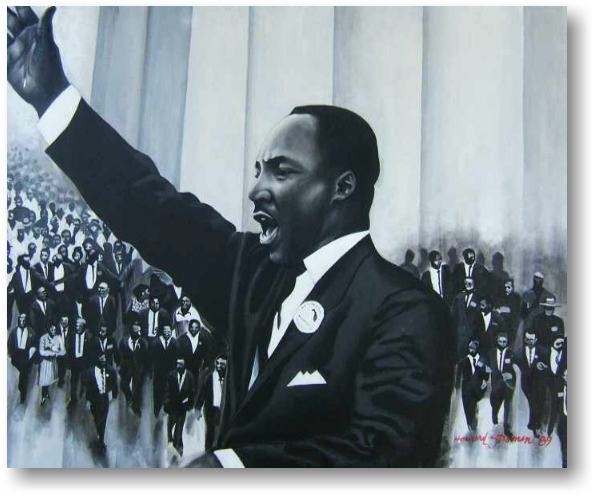January 18, 2010
Written by C.N.
Dr. King, Race, Politics, and a Colorblind Society
Today we celebrate Dr. Rev. Martin Luther King Jr.’s birthday and legacy as a national holiday. I would like to use this occasion to reflect a little bit on one part of Dr. King’s dream and how far we have come toward accomplishing it.
Specifically, I refer to Dr. King’s wish that one day soon, we would live in a society in which, as he eloquently put it, people “would be judged not by the color of their skin but by the content of their character,” a vision that we commonly refer to as a “colorblind” society. This ideal has remained an ultimate goal for many in American society, from a wide variety of racial and ethnic backgrounds. But are we there yet? How close are we to achieving that dream?

Many Americans thought that Barack Obama’s election was the culmination of Dr. King’s dream and concrete proof that we have evolved into a “post-racial,” colorblind society. Unfortunately, as I and many other sociologists and commentators have argued, even in this past year, we have seen numerous incidents that illustrate just how prevalent racial distinctions and racism still are in American society.
As another example, just recently, there was the uproar over Senator Harry Reid’s comments from the presidential campaign that Barack Obama had a good chance of being elected because he was “light-skinned” and had “no Negro dialect, unless he wanted to have one.” Many conservatives charged that Senator Reid’s comments were racist and that similarly due to the racist comments uttered by former Senator Trent Lott, Reid should resign. Others pointed out that conservatives were being hypocritical in pointing out this particular example of “racism” while basically ignoring other examples of racism directed toward Barack Obama over the past few years.
Similarly, others like Professor Joe Feagin point out that Harry Reid was just verbalizing an implicit reality that still operates within American society — the “backstage” racism that still exists among many White Americans who are reluctant or unwilling to vote for an African American candidate (or even any candidate of color) unless that candidate looks and acts as “White” as possible.
The point of these examples is to illustrate that in contrast to what many Americans had hoped, unfortunately we are not yet close to living in a colorblind society. While Dr. King’s dream remains the ideal, the realities of the U.S. racial/ethnic landscape are quite different.
With this in mind, I would also argue that allies and supporters of anti-racism and racial equality should accept this reality, that race is still a significant marker of differentiation in our county, rather than naively proceeding with the assumption that being colorblind is the best approach within this context.
In other words, many Whites (and other Americans of different racial/ethnic identities) try to fight back against racism by trying to be colorblind in their daily lives. They try to treat everybody they meet, interact with, or hear about, solely as an individual rather than as a member of a racial group. They genuinely believe that ignoring race is the best way to move forward toward a colorblind society. Even worse, many Americans who otherwise consider themselves “progressive” criticize people of color for “obsessing” over race and that we somehow create our own oppression by recognizing race.
While trying to be colorblind is indeed a noble and well-intended idea on the individual, interpersonal level, the problem is that the idea of colorblindness is not reinforced on the institutional level and therefore, it is just not practical given how American society continues to be racialized, as I described above, and how racism continues to largely operate independently of individual motivations. In other words, ignoring the problem will not make it go away, nor will it solve anything.
As many educators point out, if anything, trying to be colorblind only makes racism worse because people then mistakenly and naively believe that all forms of racial inequality and discrimination have been eliminated, that everybody is now on an equal playing field with equal access to all social opportunities, and that American society is a true meritocracy.
More generally, the fundamental problem is not racial differences themselves. Instead, the root of racism is that certain racial markers or characteristics have been assigned institutional value judgments of “good” versus “bad,” “normal” versus “abnormal,” and “human” versus “sub-human.” This process has led to certain racial groups being privileged and systematically advantaged over others. Or in the words of Audre Lorde, “It is not our differences that divide us. It is our inability to recognize, accept, and celebrate those differences.”
Ultimately, the best way for us to work toward achieving the ultimate colorblind ideal is to recognize, accept, and understand that racial distinctions still matter and that they are still the basis for continuing discrimination and inequality in American society today. Only by doing so will we move forward on achieving Dr. King’s final ideal — true racial equality.
Author Citation
Copyright © 2001-2025 by C.N. Le. Some rights reserved. 
Suggested reference: Le, C.N. 2025. "Dr. King, Race, Politics, and a Colorblind Society" Asian-Nation: The Landscape of Asian America. <https://www.asian-nation.org/headlines/2010/01/dr-king-race-politics-colorblind-society/> (April 1, 2025).
Short URL: https://www.asian-nation.org/headlines/?p=1558
Tags:
Translate Into Another Language![]()

